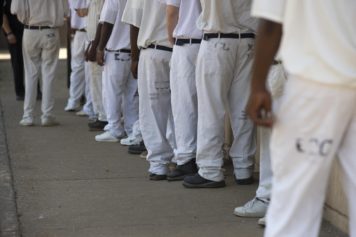Barack Obama made history in 2015 by becoming the first sitting president to visit a federal prison in an attempt to bring attention to his call for reform of the criminal justice system and reduce incarceration rates. In the backyards of Washington D.C., Taylar Nuevelle, founder and CEO of the Who Speaks for Me? Project, had also been tirelessly fighting for attention on criminal justice issues. Without the bully pulpit of then-President Obama, Nuevelle has been trying to ignite a discussion on the incarceration of women, particularly Black women, trapped in a justice system that refuses to acknowledge or focus on their detention.
The movement for prison reform has gained much traction since the 2010 release of Michelle Alexander’s The New Jim Crow, a book that popped the lid on the prison system in the United States, showing how the justice system racially targets Black people for incarceration. Recently, the critically acclaimed documentary “13th” exposed the horrors of the prison industrial complex and the loophole in the 13th Amendment that allows the practice of modern-day slavery in the United States.
Yet, much of the attention has been given to male prisons, with very few studies being made about women in the justice system. According to the Prison Policy Initiative, women in the U.S. make up only 5 percent of the female population in the world but account for 30 percent of the world’s incarcerated women. Women are currently the fastest-growing group of inmates in the United States. Black women remain the most likely to become incarcerated.
Nuevelle herself is a survivor of the system of incarceration and is now telling her story. It was her experience while being incarcerated at the Corrections Corporation of America (CCA/CTF) D.C. and in the Federal Bureau of Prisons that inspired her to launch the Who Speaks For Me? Project.
Nuevelle stated “One day, I lay on my back looking up at the ceiling in the cold, cold cell — the suicide-watch cells are so cold my fingertips turned blue — I whispered, ‘Who speaks for me?’ Prison is ripe for abuse as it is an isolated world of its own. The prison system answers to itself and we women often have no outside help to speak up and advocate for us for medical needs, access to productive and ongoing mental health treatment or meaningful programming.”
While incarcerated, Nuevelle, although not a lawyer, volunteered her services by providing legal advocacy for women at the prison. When no one else would go to bat for the women, Nuevelle would speak for her fellow sisters. She has incorporated this advocacy work as an extension of the Who Speaks for Me? Project, visiting halfway houses for re-entering women and providing resources and advocacy services.
Women face a unique kind of violence while in prison, which was not designed with them in mind. Existence often is especially uncomfortable and humiliating. To make matters worse, incarcerated women experience the most sexual violence. According to The Guardian, women represent 13 percent of the prison population but make up two-thirds of victims who experience staff-on-inmate sexual violence.
“No one wants to talk about what it is like to have a monthly menstrual cycle while incarcerated and how humiliating this can be when men run the prison,” Nuevelle says. “Pap smears don’t happen, mammograms go incomplete and rape goes unreported.
“Thus, the trauma that women experience prior to prison goes untreated and they become more traumatized by incarceration.”
That trauma is only a continuation of the trauma most have gone through their entire lives. According to one study submitted to the Bureau of Justice Assistance/Dept of Justice at least 86 percent of women incarcerated experienced sexual violence at some point in their lives. This is especially true for Black women. Nuevelle remarks “Women, especially poor Black women, carry the brunt of America’s racism. When we end up on the journey of the trauma-to-prison pipeline, we are cloaked in shame. This shame is reinforced by our society when our truths go ignored and our stories untold.”
The “trauma-to-prison pipeline,” a term Nuevelle herself coined, refers to the phenomena particular to women who grow up in abusive homes or experience trauma, sexual violence and domestic violence at some point in their lives. A woman’s attempts at coping or surviving the abuse often lead to her becoming more likely to be incarcerated later in life. Drug use and other low-level offenses that are linked to past traumas, mental health and job and housing insecurity end up pushing women into the justice system. The term “trauma-to-prison pipeline” is catching on in policy circles in Washington as a result of Nuevelle’s work through the Who Speaks for Me? Project.
Using this framework as a reference point for approaching the issues incarcerated women face, the Who Speaks for Me? Project works within prisons to provide trauma-informed programming and care, offer training for criminal justice stakeholders and advocate for policy initiatives that disrupt the trauma-to-prison pipeline. The project launched its pilot writing program, “Sharing Our Stories to Reclaim Our Lives: Understanding the Journey on the Trauma-to-Prison Pipeline for Women and Girls,” at the Correctional Treatment Facility in D.C.
The “Sharing Our Stories to Reclaim Our Lives” community forum held in various locations in the D.C area has been a considerable success, providing a space in which justice-involved (people who have been incarcerated) women can share their experiences during and post-incarceration. The project’s trauma-informed training helps develop useful skills toward trauma-informed services and care. Who Speaks for Me? continues its crucial work bringing justice women (formally incarcerated women) into the discussion of mass incarceration. For Nuevelle, no issue hits closer to the bone.
“The national media must do its part and spread the truth about justice-involved Black women and girls as widely as they do about Black men in this corrupt judicial system,” Nuevelle says. “Make our stories — the stories of us Black women and girls who are justice-involved and the fact that 90 percent of us have survived some type of major traumatic experience in our childhood and/or adult life (sexual violence, physical abuse, domestic violence and/or witnessing violence) prior to incarceration — headline news.”
Dubian Ade is an artist, writer and activist from Bronx, N.Y. Ade also is the editor of The Decolonizer magazine.


